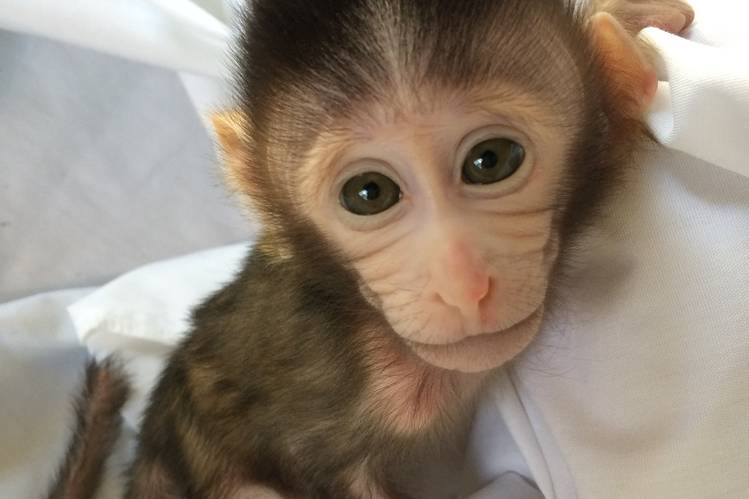

This newborn transgenic monkey has a human gene related to autism, which the researchers in Shanghai who announced the genetic engineering experiment on Monday say will speed the search for effective treatments.
Genetic engineers in Shanghai say they have created monkeys that carry a rare human gene related to autism, which could help them identify brain malfunctions that cause serious behavioral problems.
The scientists at the Chinese Academy of Science’s Institute of Neuroscience, who announced their feat Monday in Nature, are using the transgenic monkeys to probe the biology of social isolation and repetitive behavior, which are hallmarks of autism spectrum disorders.
"We think this transgenic monkey offers a unique model to study human autism disorders," said lead researcher Zilong Qiu in Shanghai.
It is the latest experiment in which researchers altered monkeys by adding human genes, to make them better laboratory models than mice for probing brain-related disorders. Other researchers in the U.S. and China are breeding genetically altered monkeys to study Huntington’s disease and Parkinson’s disease. While controversial, such primate research is critical for testing new treatments for neurological conditions like autism, schizophrenia and Alzheimer’s disease, the researchers said.
"For understanding the human brain, we better have an animal model with a brain very close to the human brain," said neurobiologist Mu-ming Poo, director of the neuroscience institute, where five groups are developing transgenic monkeys to study various movement-related problems. "We think a nonhuman primate is absolutely required in the long run for development of drugs for human psychiatric diseases."
No one is sure what causes autism. All told, researchers so far have identified 65 genes that may contribute to autism in some way and developed 11 different strains of genetically engineered mice to study their effects. Yet the biology of the brain malfunctions that underlie the disorder remain a mystery.
In the new experiment, Dr. Qiu and his colleagues singled out a gene called MECP2 linked to a rare childhood disorder, usually among boys, that shares some behavioral symptoms with autism.
People born with extra copies of that gene are afflicted with speech abnormalities, poor muscle tone, seizures, spasms, and hypersensitivity to pain or temperature. The syndrome can, like autism, also cause social isolation and repetitive behavior.
In the Shanghai experiment, the researchers used a virus to insert the human MECP2 gene into macaque monkey eggs before fertilizing them in the laboratory. They implanted the resulting embryos into female monkeys.
The altered monkeys express the new gene in their brain tissue, pass it to their offspring, and so far, two generations of the monkeys have shown “similar behavior to human autism patients,” Dr. Qiu said. The monkeys are in most ways normal, but are more anxious than their unaltered kin, run repetitively in circles inside their cages, and are less likely to interact with others.
In brain imaging studies now under way, the researchers hope to isolate the neural circuits that are affected by the new gene. (Wall Street Joural)

86-10-68597521 (day)
86-10-68597289 (night)

86-10-68511095 (day)
86-10-68512458 (night)

cas_en@cas.cn

52 Sanlihe Rd., Xicheng District,
Beijing, China (100864)

